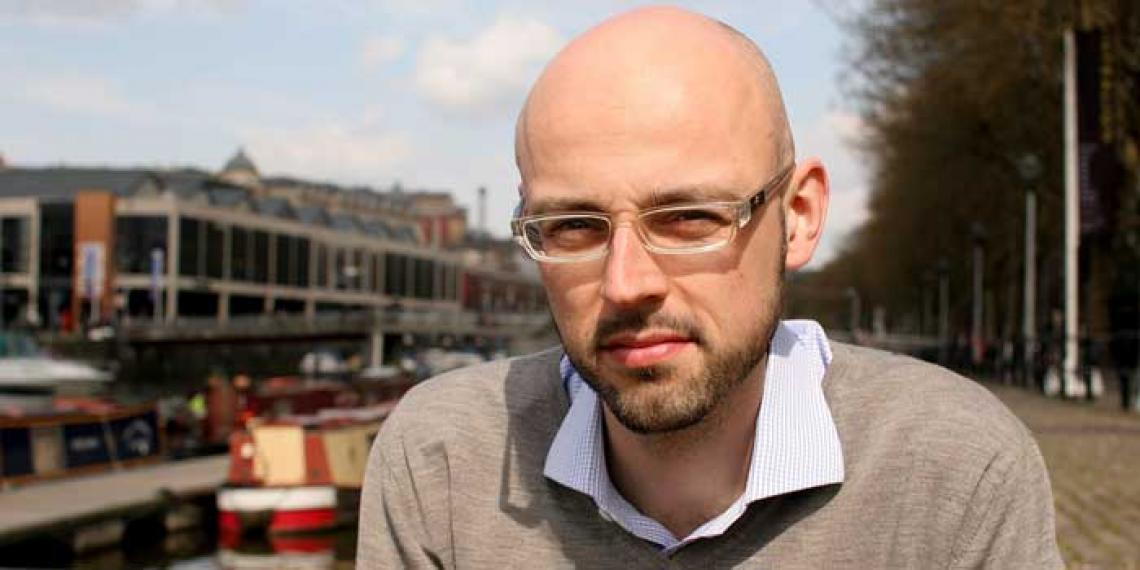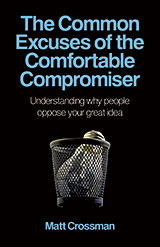You are here
An argument against everything

From slavery to our modern-day sustainability movement, the same arguments have always been used to avoid change, says author Matt Crossman.
But there is one argument that wins them all.
In the 1880s, pioneering women of The Salvation Army adopted reinforced bonnets to protect them from flying rocks and rotten eggs. Bramwell Booth wrote that the fiercest opposition to the radical new Army was not from ‘drunkards’, but from the local churches: ‘We were a menace to their “comfortable” worship,’ he said in his 1925 book Echoes and Memories.
With 21st century eyes, such hostility seems bizarre, but author Matt Crossman says that ‘nothing has really changed’. In his book The Common Excuses of the Comfortable Compromiser, Matt examines how we fiercely defend our own comfort and uncovers the same nine arguments used to stifle anyone, any campaign and any cause that is fighting for change.
As an ethical banker in the UK, Matt screens global companies for their ethical practices and acts as a spokesperson on behalf of investors to keep companies accountable. ‘So we meet with these companies when stuff goes wrong; for example, we discover child labour in their supply chain,’ he says. ‘And I got used to having the same arguments [against ethical practices] no matter what the issue.’
It was the dark history of slavery in Matt’s adopted hometown of Bristol that inspired him to write the book. ‘Bristol was a big slaving port, and I was doing a lot of research on fair trade,’ he recalls. ‘I realised the arguments against fair trade are exactly the same arguments that were used against the abolition of slavery. And I thought, “Man, nothing’s changed.” ’
One of the most common arguments, says Matt, is that ‘it could be worse’. ‘So we often hear, “Yes, it’s not ideal, but the alternative would be worse. Without naming names, I’ve found that if we tell a company we’ve discovered incidents of child labour in their apparel, their response will be, “Well, it’s really hard to increase standards, and if we weren’t there another company with even lower standards would make it worse.” Or, “If we pulled out, they would all lose their jobs.” These arguments are a way of not engaging with the issue.’
A seemingly innocuous argument is the supposedly ‘watertight’ use of statistics. ‘I was working with a company looking into running a public transport link across East Jerusalem—one of the most disputed territories in the world—and there were a lot of international legal problems. They said, “Well, we’ve done a survey”, but refused to show me the questions. I knew they could have simply asked questions that would get them to the answer they wanted.’
Through dissecting these arguments, Matt replaces the ‘buts’ with a ‘can do’ attitude. It’s something he has helped bring to his own community through a charity called LoveBristol. ‘I go to a good-sized church of about 1000 and gradually got the feeling we weren’t having an impact on people around us; we were in a holy huddle. So we launched a group to be more outward looking.’
LoveBristol began a community house with an open door policy, created a ‘pop up’ bakery as a community connection and regularly do projects to regenerate the neighbourhood. They also champion other people’s ideas—such as a furniture recycling shop called Happy Tat (a play on famous UK homestore Habitat) that provides business oversight and mentoring. ‘We wanted to adopt a “why not” attitude to people’s good ideas,’ Matt explains.
In his current community house, Matt lives with 23 people—‘aged from six months to 60’—where they share meals and have nightly communication and prayer. ‘The core message of the church is loving, serving and reaching out to people, “against such things there is no law” [Galatians 5:23],’ says Matt. ‘People may be offended, but as long as we’re loving and serving others, we’ll always have an impact and keep reaching people.’
This is the DNA of The Salvation Army: rotten eggs have given way to a heritage of loving and serving others. The challenge is to continue being ‘can do’ and ‘why not’ people.
By Ingrid Barratt (abridged from War Cry 23 February 2013, p11)
The (Nine) Arguments Against Everything
 - but it could be worse
- but it could be worse
- but we’ve tried before—and failed
- but we’ve always done it that way
- but the economy will collapse
- but we can’t afford it
- but ‘the system’ won’t let us
- but our statistics said ...
- but we’re not the right people
- but it’s not the right time
* Download The Common Excuses of the Comfortable Compromiser by Matt Crossman at www.amazon.com or www.jhpbusiness-books.com/books/common-excuses-comfortable-compromiser